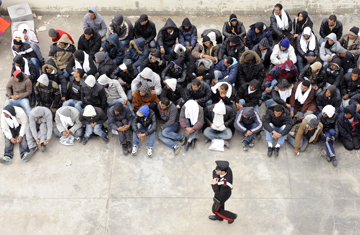
A Carabinieri officer walks past migrants on the Italian island of Lampedusa on Feb. 14, 2011
Although initially wrong-footed by the uprisings across the Arab world, European nations eventually collected themselves, welcomed the new eras in Tunisia and Egypt, and blessed the yearning for democracy that is spreading across the region. But the European Union's delicate diplomatic dance has been tainted by a conflicting message of hostility: while throwing their support behind the Arab protests, officials are simultaneously shrieking at the prospect of Arab migrants seeking refuge in Europe.
This split personality was on display at a meeting of E.U. foreign ministers in Brussels on Feb. 20-21. The ministers promised a "new partnership" with Egypt and Tunisia, offering to help rebuild civil institutions and boost economic ties. In a joint statement, they backed "the peoples of the South Mediterranean and their legitimate hopes and aspirations for democratic change, social justice and economic development." And with an eye on Libya's escalating unrest, the ministers said the E.U. "sternly condemns the ongoing repression against demonstrators."
But the meeting was dominated by fears about Europe being on the receiving end of an influx of migrants. Italian foreign minister Franco Frattini warned that the crisis in Libya could set off an "unimaginable" flow of migrants into his country. He pointed to the recent surge of around 6,000 Tunisians landing on the tiny Italian island of Lampedusa, just 150 miles off Sicily, and said this could be a harbinger of an immigration flood. "Those who spoke of hundreds of thousands" of people crossing into Europe "are not exaggerating," Frattini said.
Italy's anxiety has been heightened by Libyan leader Colonel Muammar Gaddafi's threat to scrap recent deals aimed at curbing illegal migration from his country to Europe if the E.U. continues to back pro-democracy protests. "This is totally out of order," German Europe minister Werner Hoyer said on Feb. 21. "The European Union must not let itself be blackmailed."
Lampedusa is closer to Tunisia than it is to Italy, and until 2007 it was seen as a gateway to Europe for migrants from across Africa. But a 2009 bilateral agreement between Italy and Libya — like more recent deals between Spain and Senegal, and Greece and Turkey — saw the number of migrants heading north drop dramatically as controls on those fleeing were tightened. Now, with North African regimes in flux, their desperate citizens are once again crossing the Mediterranean in rickety boats.
While many assumed that Tunisia's Jasmine Revolution would trigger emotional homecomings for refugees, the landings in Lampedusa have shown that a mere change of government has not made Tunisia's economic problems go away. Migrants are undeterred by reports of Europe's high unemployment, with 24 million out of work and joblessness amongst the young reaching 43% in Spain and 25% in Italy. "Many Tunisians see their best chance for a better life in Europe rather than at home," says Eric Goldstein, deputy Middle East and North Africa director at Human Rights Watch. And Jorgen Carling, a migration specialist at the Peace Research Institute Oslo, says the Arab revolutions could threaten Europe's collaboration with North African authorities on the issue of stemming illegal immigration. "If the Arab uprisings produce staunchly anti-western governments, they could use the emigration pressure for leverage in relations with Europe," he says.
The alarm about immigration masks the fact that many European countries have serious workforce deficits in sectors such as health, technology and farming — and these will spread as the continent ages. The E.U.'s active population will start falling as early as 2014, and projections suggest the E.U. workforce will shrink by 50 million over the next 50 years. These trends suggest a rethink is needed when it comes to immigration, not least because an ageing Europe will in future need more foreign workers. "Ideally, you need more fresh blood, particularly in the south, in Spain, Italy and Greece," says Christian Joppke, professor of political science at the American University of Paris. "But politically, this sort of talk is suicidal. There is a fear of the populist right that paralyzes the debate on immigration."
Indeed, Europe's pledges to help the transition to democracy in North Africa can be seen as part of its border policy: by promoting a ring of well-governed, economically sound countries around its southern rim, Europe hopes to head off a potential flood of illegal migrants. E.U. foreign policy chief Catherine Ashton has already asked E.U. governments for an additional $1.4 billion loan for North African countries to help small- and medium-sized businesses and to boost transport infrastructure. Ashton, who on Feb. 22 became the most senior foreign diplomat to visit Egypt since President Hosni Mubarak's resignation, also hosted a high-level international conference in Brussels on Wednesday aiming to craft a global response to the Arab revolution.
If Europe's governments and businesses come through with their offers to help rebuild the region, that should help the Arab world's transition to full democracy, stability and prosperity. However, if the motive is to curb immigration, it is hardly the most noble, inspiring or even consistent message to send the millions marching for freedom across North Africa and the Middle East.
